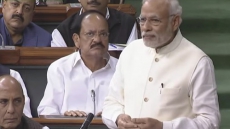An applicant's English language skills are likely to be ranked according to levels of proficiency in a new post-Brexit visa regime being finalised by UK home secretary Priti Patel.
Britain's senior-most Indian-origin Cabinet minister in the Boris Johnson-led government commissioned a major review on Wednesday to kickstart her plans to implement an Australian-style points-based system of immigration in a letter to the UK's influential Migration Advisory Committee (MAC).
Along with English language proficiency, educational qualifications and work experience are some of the other factors that are likely to be at the heart of a new immigration system at the end of Freedom of Movement rules, which currently apply as part of the UK's membership of the European Union (EU).
"The British public have been clear that they want an immigration system that takes back control of our borders while welcoming aspirational and hard-working people to enhance the UK's dynamic labour market and diverse society. This government is working on making that a reality," Ms Patel said in a letter to the MAC, commissioning the organisation to expand its ongoing research on a post-Brexit visa regime beyond that put in place by her predecessor Sajid Javid.
"I am asking the MAC, as part of their current work on future potential salary thresholds, to conduct a review of the Australian immigration system and similar systems to advise on what best practice can be used to strengthen the UK labour market and attract the best and brightest from around the world," she writes.
Javid, now UK Chancellor, had presented a white paper on what Britain's skills-based immigration system would look like after Britain has left the EU -- the latest deadline for which is October 31.
He had commissioned the MAC to conduct a review on salary thresholds that should be imposed on skilled visa applicants from around the world, including India, which currently stands at GBP 30,000 a year.
Patel, a long-term advocate of the Australian visa strategy which functions on a points-based system, has now asked MAC to additionally consider how additional flexibility could be added to the operation of salary thresholds through the awarding of "points" to prospective migrants for the attributes that they possess.
"Such as their educational qualifications, language proficiency, work experience, willingness to work in particular areas and occupation; and the degree to which points in one area should be ''tradeable'' to make up for a lack of points in another," Patel''s letter noted.
Australia's points system awards 20 points for skilled migrants with "superior" English - based on scoring an eight or more in an internationally-recognised language test - and 10 points for "proficient" English, based on a score of seven.
Those with just competent English score no points.
"We are seizing the once in a lifetime opportunity of our exit from the European Union and the end of Freedom of Movement. In future, we will replace the current dual system - which admits highly skilled workers from outside the EU and workers of all skill levels from within the EU - with a single, skills-based system that welcomes to the UK the people who will contribute, but that enables us to control migration," Patel said.
The issue of migration was among the central factors in the lead up to the June 2016 referendum, in which the UK voted to leave the EU.
Hard Brexiteers like Priti Patel had argued that once Britain was out of the 28-member economic bloc, it would be able to implement a fairer immigration policy that did not discriminate against the country of origin of applicants.
"Delivering on the promise to introduce an Australian-style points-based system is part of our approach to improving public confidence in our immigration system whilst allowing us to welcome talented and skilled individuals from all over the world," Patel notes.
The MAC is to present its report by January 2020, following which its recommendations would be considered for incorporation in a new immigration bill for Parliament.

